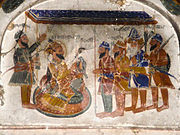
Back فلسفة هندية Arabic فلسفه هنديه ARZ ভাৰতীয় দৰ্শন Assamese Hind fəlsəfəsi Azerbaijani Һинд фәлсәфәһе Bashkir Индийска философия Bulgarian भारतीय दर्शन Bihari ভারতীয় দর্শন Bengali/Bangla Pensament de l'Índia Catalan Indická filozofie Czech
| |||||
| Part of a series on |
| Eastern philosophy |
|---|
|
|
| Part of a series on |
| Philosophy |
|---|
Indian philosophy consists of philosophical traditions of the Indian subcontinent. The philosophies are often called darśana meaning, "to see" or "looking at."[2][3] Ānvīkṣikī means “critical inquiry” or “investigation." Unlike darśana, ānvīkṣikī was used to refer to Indian philosophies by classical Indian philosophers, such as Chanakya in the Arthaśāstra.[3][4]
A traditional Hindu classification divides āstika and nāstika schools of philosophy, depending on one of three alternate criteria: whether it believes the Vedas as a valid source of knowledge; whether the school believes in the premises of Brahman and Atman; and whether the school believes in afterlife and Devas.[5][6][7] (though there are exceptions to the latter two: Mimamsa and Samkhya respectively).
There are six major (āstika) schools of Vedic philosophy—Nyaya, Vaisheshika, Samkhya, Yoga, Mīmāṃsā and Vedanta—and five major non-Vedic or heterodox (nāstika or sramanic) schools—Jain, Buddhist, Ajivika, Ajñana, and Charvaka. The āstika group embraces the Vedas as an essential source of its foundations, while the nāstika group does not. However, there are other methods of classification; Vidyaranya for instance identifies sixteen schools of Indian philosophy by including those that belong to the Śaiva and Raseśvara traditions.[8][9]
The main schools of Indian philosophy were formalised and recognised chiefly between 500 BCE and the late centuries of the Common Era.[citation needed] Some schools like Jainism, Buddhism, Yoga, Śaiva and Vedanta survived, but others, like Ajñana, Charvaka and Ājīvika did not.
Ancient and medieval era texts of Indian philosophies include extensive discussions on ontology (metaphysics, Brahman-Atman, Sunyata-Anatta), reliable means of knowledge (epistemology, Pramanas), value system (axiology) and other topics.[10][page needed][11][12][13]
- ^ Scharfstein, Ben-Ami (1998). A comparative history of world philosophy: from the Upanishads to Kant. Albany: State University of New York Press. pp. 9–11. ISBN 978-0-7914-3683-7.
- ^ "Monier-Williams Sanskrit Dictionary 1899 Basic". www.sanskrit-lexicon.uni-koeln.de. Retrieved 24 May 2024.
- ^ a b Adamson, Peter; Ganeri, Jonardon (2020). Classical Indian philosophy: a history of philosophy without any gaps. Oxford New York (N.Y.): Oxford university press. ISBN 978-0-19-885176-9.
- ^ Kauṭalya; Olivelle, Patrick (2013). King, governance, and law in ancient India: Kauṭilya's Arthaśāstra: a new annotated translation. New York: Oxford University Press. ISBN 978-0-19-989182-5.
- ^ Bowker 1999, p. 259.
- ^ Doniger 2014, p. 46.
- ^ Nicholson 2010, Chapter 9.
- ^ Cowell & Gough 2001, p. xii.
- ^ Nicholson 2010, pp. 158–162.
- ^ Perrett, Vol. 3 2000.
- ^ Phillips, Stephen H. (2013). Epistemology in Classical India: The Knowledge Sources of the Nyaya School. Routledge. ISBN 978-1-136-51898-0.
- ^ Sharma, Arvind (1982). The Puruṣārthas: a study in Hindu axiology. Asian Studies Center, Michigan State University. ISBN 9789993624318.
- ^ Bilimoria, Purusottama; Prabhu, Joseph; Sharma, Renuka M., eds. (2007). Indian Ethics: Classical traditions and contemporary challenges. Ashgate. ISBN 978-0-7546-3301-3.



